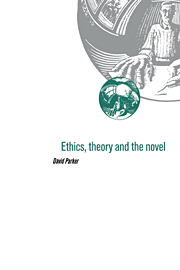Part II - SOCIAL BEINGS AND INNOCENTS
Published online by Cambridge University Press: 05 November 2011
Summary
The current revival in ethical criticism assumes that living well partly depends on the richness, intelligence, and practical wisdom of the stories we tell ourselves, both individually and as a culture. My inquiry begins from the suggestive fact that some of the richest stories in European culture over the past 150 years or so, many of those most widely regarded as ‘canonical’, have been about adulterous and/or triangular relationships. This includes novels such as Wuthering Heights, Madame Bovary, and Portrait of A Lady, as well as Middlemarch, Anna Karenina, and Women in Love – to name only a few. Why should this be so? Very few critics have addressed this question of why some particular sort of story should so fascinate a culture that it needs to go on retelling it.
Michael Black in The Literature of Fidelity implies some answers, but only Tony Tanner in Adultery and the Novel explicitly proffers some. For Tanner (who offers a very long list of examples), what distinguishes the treatment of adulterous and triangular relationships in ‘the great bourgeois novel’, as opposed to the presentation of them in Homer, Shakespeare, and the eighteenth century, is the conflict between two originally biblical perspectives. On the one hand, there is the Law, which upholds marriage as the very cornerstone of bourgeois society and therefore condemns transgression, while on the other there is Sympathy, one of the major cornerstones of Christianity, which teaches understanding and forgiveness.
- Type
- Chapter
- Information
- Ethics, Theory and the Novel , pp. 67 - 76Publisher: Cambridge University PressPrint publication year: 1994



